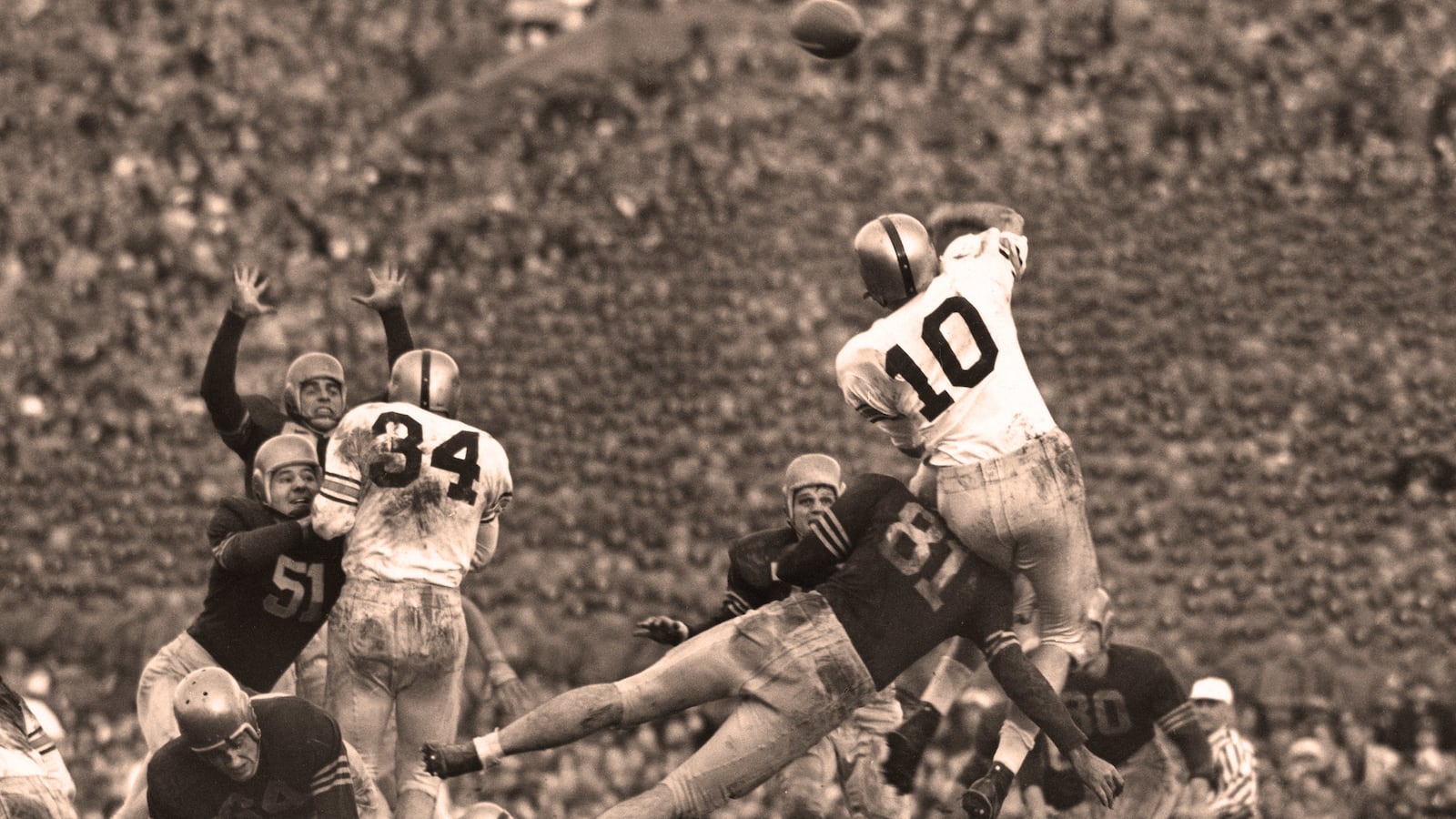The epitaph on Dennis Lewis’s headstone in the West Point Cemetery consists of just one line: “A West Point Football Player.” The epitaph, which appears above the Ranger tab and airborne wings that have been carved into the headstone, is taken from a quote attributed to General George Marshall when he was Army chief of staff during World War II: “I want an officer for a secret and dangerous mission. I want a West Point football player.” The quote is apocryphal, but that has not changed its significance for Army football players. The quote appears on the bronze plaque the players touch before they take the field for home games. For the players, who over the years have made a ritual of touching the plaque, the quote expresses the inner resolve they seek to live by.
Dennis Lewis was one of the West Point players who did his best to embody that resolve, but he was far from being a typical West Point football player. Lewis did not get on the field for a single varsity game during his four years at West Point. After his plebe year, he was assigned to the B squad, Army’s practice squad, and there he stayed. In his senior year, Lewis was not included in the group photo of the 1964 team.
Army B-squad players who fail to make it onto the varsity team after a year or two usually quit football. They don’t see the training and the long practices as paying off for them. For Lewis, the opposite was true, and the varsity players he practiced against all week long admired him for staying with the football program throughout his four years at West Point. At Lewis’s funeral service at Army’s Old Cadet Chapel, Rollie Stichweh, the quarterback and captain of Army’s 1964 varsity team, delivered a eulogy and the chapel pews were filled with players from the team.
I did not expect to be writing about Dennis Lewis when I began Every Army Man Is with You. My subject was the Army players who, in the 1964 season, made headlines across the country by beating a Navy team led by All-American quarterback Roger Staubach and then shipped off to Vietnam soon after their required military service began. What interested me when I started my research was how the players balanced the highs they achieved as West Point football players with their experiences in a war the country turned against before it was over.
I learned of Lewis because the players kept bringing up his name in the interviews I did with them. Lewis died in 2009 while awaiting a heart transplant at the University of Pittsburgh Medical Center, but for the players I spoke with, he was still very present. From the players I learned that when their classmate Bob Jones returned to the United States after more than five years as a North Vietnamese prisoner of war, it was Lewis who organized a reception at his home in Warren, Ohio, for Jones. The players also told me how, when another classmate and Vietnam vet, Tim Vogel, was suffering from progressive supranuclear palsy, a rare brain disorder that has Parkinson’s-like symptoms, it was Lewis who stepped in and took over custodianship of Vogel when his family could no longer do so.
When they thought about Lewis, what struck the players most was that he never acted like a do-gooder. He was too busy just being himself. “He was one of those guys who was the backbone of my experience at West Point,” remembered Bill Zadel, the giant starting tackle who played the same position as Lewis. John Johnson, who played both wingback and cornerback for Army in 1964, felt the same way. For Johnson, Lewis was “the heart and soul of our team.” When Paul Dietzel, Army’s coach during Lewis’s West Point years, learned of Lewis’s death two months after it occurred, he was stricken with the thought that Lewis’s wife ,Marie, might think that as a B-squad player, Lewis never caught his attention. “My deepest apologies for not writing sooner,” he began his letter to her by saying. “It is my distinct honor to have been Dennis’s coach.” Dennis was, Dietzel wrote, “not a star” but something better, “one of those people loved by everyone who was lucky enough to call him friend.”
In 2000 the newly formed Army Football Club, using its power to award letters for service to West Point football, gave Lewis the “A” he had never gotten while a cadet. The award surprised Lewis, but it also struck the right note. The ceremony turned out to be a joyful, as well as a tearful, occasion, more moving, many of Lewis’s teammates believed, than the time when they got their Army “A” at the awards banquet held at the end of the season. For the remaining years of his life, Lewis kept the letter in an 8”x10” gold picture frame on the dresser in his bedroom.
Marie, who had been watching Lewis play football since he was captain of his Youngstown East, Ohio, high school team, knew how proud he was of the letter, but when she spoke of her husband, she talked most of all about the kind of father Lewis was to their son and daughter. When Lewis was shipped off to Vietnam, his son was just three months old, and the timing of the assignment worried Lewis. Fearing he might be killed, Lewis wanted his son to have his name, and when he returned, he embraced fatherhood with a passion and gentleness that let his children find their own way. His son, like Lewis, an Ohio high school football star, went to Harvard, where, instead of playing football, he rowed on the crew team.
In Vietnam, Lewis was advisor to a Vietnamese infantry unit, whose nickname for him was “Captain of Many Kilos.” Lewis was the recipient of a Bronze Star, but his family remembers him making a point of never talking about the war or what he did to be awarded a Bronze Star. The army story that Marie tells that is most revealing of her husband occurred while he was undergoing Ranger training in the United States. Lewis and the men he was with were given a goat and chicken that they were expected to kill and eat while on patrol. The exercise was supposed to toughen them up and give them survival skills they might need if they had to go without food for very long.
For Lewis, who had faced the varsity running plays against him his entire time on the West Point practice squad, the challenge seemed more brutal than practical. He did not need to prove how tough he was by killing a couple of helpless animals, and he was not someone who could be intimidated by pressure. By the time Lewis finished his Ranger training, he had lost more than twenty pounds, Marie remembers, but he had never laid a finger on the goat and the chicken he was expected to kill.
The Ranger story provided me with a window into Lewis’s life, but it also brought me back to the players I was writing about. The story made it even clearer why the players cherished Lewis as much as they did. At Ranger School Lewis was a tough guy in a world of tough guys, but for him, real toughness meant caring for those who depended on you. If any belief summed up the players I was writing about, here it was. In making the transition from the football field, where there was plenty of glory to go around, to the Vietnam battlefield, where glory was hard to come by, the players found that when they thought about it, the bedrock in their lives was one another and what they stood for together.
In contrast to so many of those who were drafted, the players did not enter the Vietnam War reluctantly. Their education had been about fighting wars. Their transition from West Point to Airborne and Ranger schools was as natural for them as the transition from college to business school or law school for an Ivy League grad. Vietnam was the problem. The players took pride in serving with honor, but it was not possible to come away believing that they were part of a successful war effort. Combat experience allowed the players to see the failings of America’s military strategy with its focus on body counts, and beginning in 1971 with the publication of The Pentagon Papers, the players were forced to deal with the revelation that the war they had been asked to risk their lives for was one that the president and secretary of defense, who sent them into battle, came to doubt could be won.
Had the players shared the politics of so many college students their age, it would have been easy for them to turn against the war and grow cynical about the country, treating America as Amerika. Any number of the best and brightest of their generation did both, but the players belonged to a different group of ’60s young. They don’t fit neatly into anyone’s category—liberal or conservative—of what a Vietnam vet is supposed to be like. For them, going to Vietnam was inseparable from living up to their obligations as West Pointers and citizen soldiers. Although they regularly pay homage to teammates and classmates who died in Vietnam, the players have never written off their lives as tragic, let alone lost. Their perspective on Vietnam and their postwar lives goes far beyond the disillusionment that characterizes the soldiers in a book such as Tim O’Brien’s The Things They Carried or in a film such as Oliver Stone’s Platoon.
When I started Every Army Man Is with You, I often found myself wishing I had known the players when they were cadets at West Point or junior officers in Vietnam, but the more I interviewed the players, the more I stopped worrying about personally missing out on that earlier time in their lives. I have been lucky, I believe, to know them as mature men who could measure, without handwringing or defensiveness, the extremes they experienced while still in their twenties.
From Every Army Man Is with You: The Cadets Who Won the 1964 Army-Navy Game, Fought in Vietnam and Came Home Forever Changed. Copyright 2014 by Nicolaus Mills. Excerpted with the permission of the publisher, Rowman & Littlefield.




